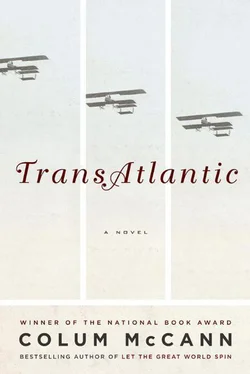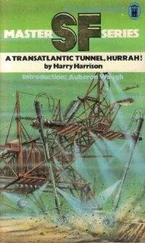— Excuse me?
— Teddy is just fine.
— It’s a pleasure to see you again, Teddy, she said.
— Your daughter?
— She’ll be along later.
— Quite the girl, if I recall.
— She’s taking some photographs along the coast.
— All grown up, I presume.
Brown himself had indeed aged considerably in the decade since the flight. It wasn’t simply the loss of the hair, or the weight that had accumulated on his frame. There was an air of hidden exhaustion about him. Slight bags under his eyes. His neck sagged. He had shaved closely — there was still a pink rawness to his cheeks, but he had cut his neck and a small trickle of blood had made its way down to his collar. He had put on a good suit, but his body seemed foreign to the cut of it.
A whiff of disintegration about him, yes, but surely no more, she thought, than her own.
He took her elbow lightly and brought her over to the couch, indicated for her to sit down, pulled up a small wicker chair. He leaned to the low glass table and filled the teacups, gestured towards the pot as if an answer might be found there.
— I was rather neglectful, I’m afraid.
— Sorry?
He fumbled in the inside of his jacket, took out a letter, crumpled and water-stained. She recognized it straightaway. A blue envelope. The Jennings Family, 9 Brown Street, Cork .
— I was so caught up. After the flight. And then for some reason I tucked it away.
She realized that was what he must have been searching for upstairs: the sounds of shifting furniture, opening drawers, closing doors. It was not that she had forgotten about the letter — she had simply assumed that it had found its way to Brown Street, or perhaps it had been lost somewhere along the way: she and Lottie had never received a reply.
— I forgot to post it. I’m dreadfully sorry.
It was still sealed. She glanced down at her own handwriting. The ink had faded slightly. She put the letter to her lip. As if she could taste it somehow. She tucked it, then, in the back flap of the notebook.
— It’s nothing really, she said.
Brown was looking at his feet, as if nervously wondering where he might land.
— It’s an anniversary piece, said Emily.
— Excuse me?
— What I want to write, it’s a tenth-anniversary piece.
— Ah, yes. I see.
Brown coughed into his fist.
— The truth is I haven’t done that much. I don’t fly anymore, you know. I go to lunches. I’ve made rather a career out of it I’m afraid.
Brown tapped the inside of his pocket: whatever he was looking for was not there. He took out a handkerchief and dabbed it delicately across his brow. Emily extended her silence.
— I’m the best luncher there is. By dinner I start to flag. I could cross the sea on lunch alone. I rather detest these new-fangled airplanes, though. I heard they plan to serve dinner in them. Can you believe that?
— I’ve seen photographs, she said.
— The cockpit is enclosed. The pilots say it’s like making love with your hat on.
— Excuse me?
— I presume you won’t quote me on that, Miss Ehrlich? Rather rude of me to say so. But surely, well, yes, let’s just say there are ideal situations in which one should wear a hat.
This was his performance now, she sensed, he brought a breezy irony to his fame. She laughed, drew back a little from him. His days now were an ovation to the past. She knew he had probably talked the Vickers Vimy out of himself, hundreds of interviews over the years. And yet the whole of anything was never fully told. She would have to turn away from the obvious, bank her way back into it.
— My condolences, she said.
— Excuse me?
— Alcock.
— Ah, Jackie, yes.
— A tragedy, she said.
She and Lottie had been in the dining room of the Cochrane Hotel when they had heard the news. Just six months after the flight. Alcock had gone down over France. On his way to an air show in Paris. Lost in a cloud. Unable to pull the plane out from its spin. He smashed into a field. He was found unconscious in the cabin. A farmer dragged him from the wreck, but Alcock died a few hours later. He wore, on his arm, a diamond-studded wristwatch. He was buried with it a few days later.
— Ten years, Brown said, as if speaking out the window, down the lawn, towards the sea.
Emily drained her teacup and adjusted her body in the soft of the couch. The clock on the mantelpiece ticked. Shadows came into the room, slowly dissolved. She liked the play of light at Brown’s feet. She wanted to bring him back, brush all the tickertape off his shoulders, return to the moment of raw experience, above the water, to chant the moment alive once more.
— You’re a pacifist, she said.
— Of the sort that every man is I suppose. I have done little that is special, and so much that is luck.
— I admire that.
— It doesn’t take a lot really.
— You took the war out of the plane.
Brown glanced at her, looked towards the garden. He ran his hands along his wooden cane, and then tapped it off the side of the table. He looked as if he was weighing up the extent of what he might say.
— Why don’t you fly anymore?
He gave a half-smile.
— We get older, he said.
She allowed a silence, worked the flesh of her hands into the well of her dress.
— We compromise.
The sound of distant laughter from outside broke abruptly, lingered a moment, then faded.
— I suppose I’m still aloft most of the time.
He fell then into the recollection: the sheer release of being in the air. He told her of his nights in the prison camp, the return home, the thrill of the Vimy, the way the old bomber handled, the vibration of it through his body, the snow stinging his cheeks, the narrow lines of sight, the desire to see Kathleen, the way the plane had landed, the catch in the bog grass, the surprise to still be alive, the crowds in Ireland, the return home, standing on the Aero Club balcony in London, the knighthood, the prize, the day he shook Alcock’s hand for the last time. He had written a fair amount, he said, and he still made appearances, but his life was largely quiescent, he was happy at home with Kathleen and Buster. He didn’t ask too much, he already had enough.
She saw an ease come over him. She had thought him, at first, sad — earlier, when he stood in the doorway, shielded by his son — but now she detected a vibrancy in him, a return to his original self. It gladdened her. He had a slow smile that started in his eyes and pulled at his lips, until his face was drawn tighter, more intimate.
The tea had grown cold, but they poured the last of it into their cups. The shadows lay long in the room. He absently touched his jacket pocket again.
— One thing, said Brown. If I may.
He meshed his fingers together as if in some small prayer, and glanced at her. He reached out for a biscuit, dunked it in his tea. He held the biscuit a moment until it tumbled and fell. He fished out the soggy wafer with a spoon. For several moments he did not speak.
— If you’ll forgive me.
— Yes?
— It wasn’t a tragedy.
— Excuse me?
— Jackie, he said. Jackie was in his plane, you see. Exactly where he wanted to be. He would not have thought it tragic at all.
Brown pulled the spoon away from his mouth, but still held the curve of it at his chin. She wished she had brought Lottie so she could photograph him in this pose.
— Up there. Something else takes charge of your freedom. Do you understand what I mean?
She heard him inhale.
— Maybe a child, he said. Perhaps that equals it. Perhaps that is the only thing.
He was gazing out over her shoulder. She turned to see the young boy, Buster, in the garden. He was framed by the edge of the window and looked as if he was talking to someone. She turned farther around and, through the window, saw Ambrose. A cap tilted jauntily on his head. He was picking up the tennis net from the ground. He shook it out as if there were raindrops on it, then he pulled it taut. It fell to the ground once more. The two were laughing, man and boy, though they could only faintly be heard.
Читать дальше












